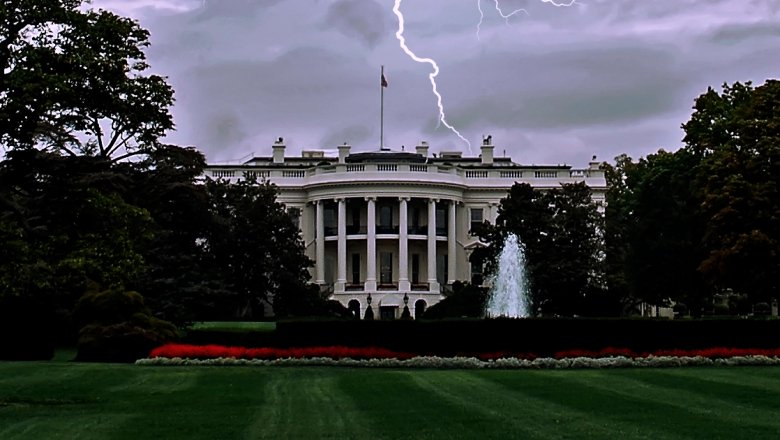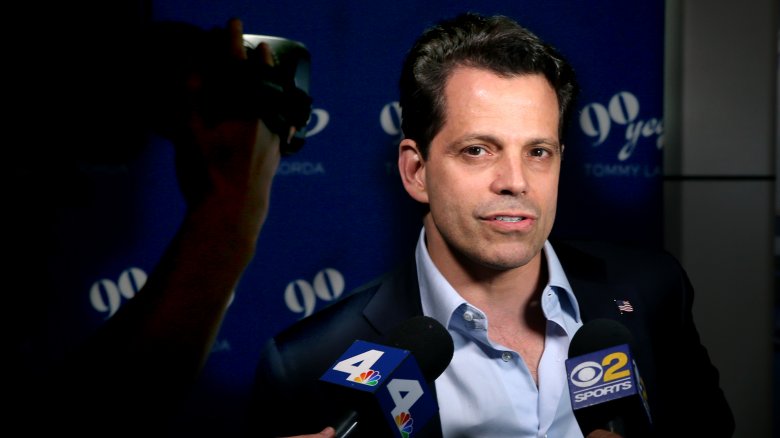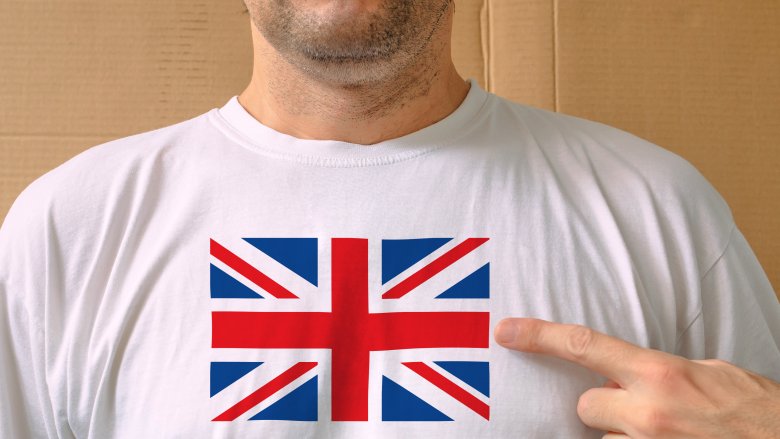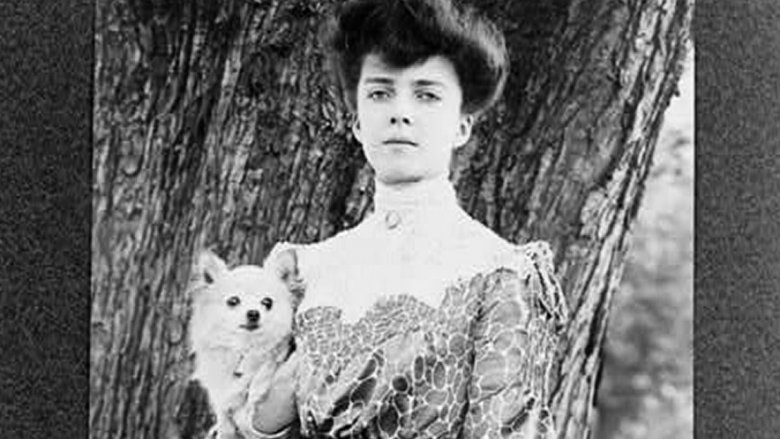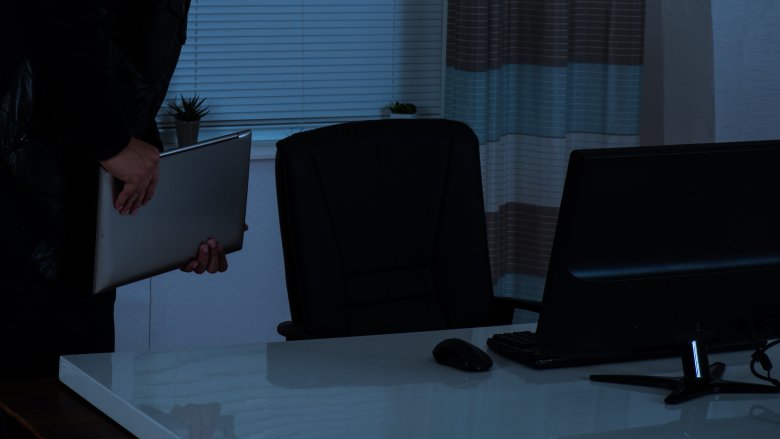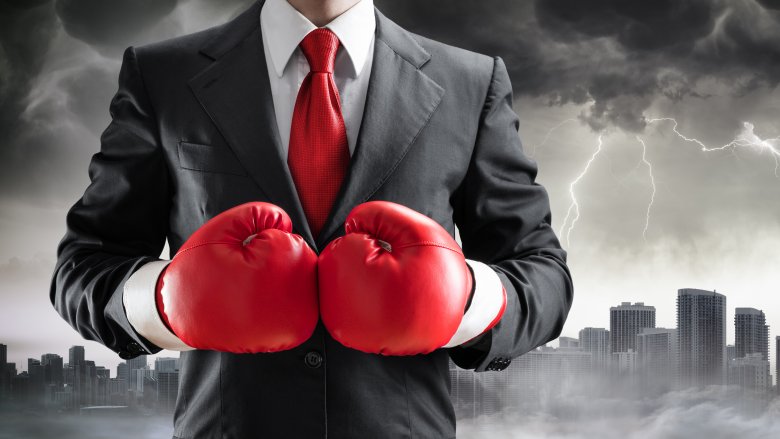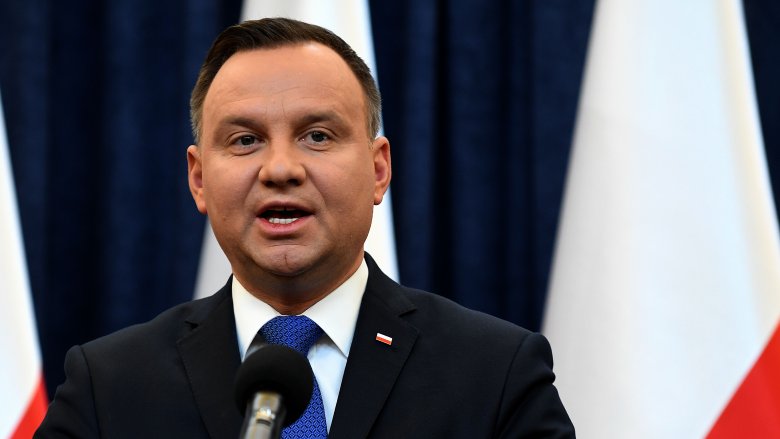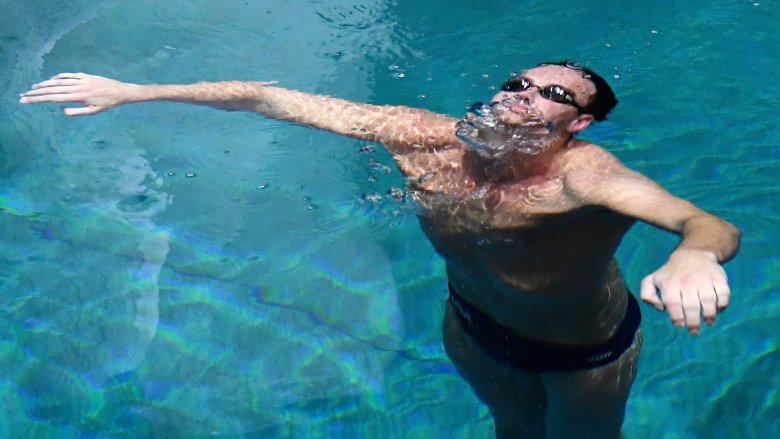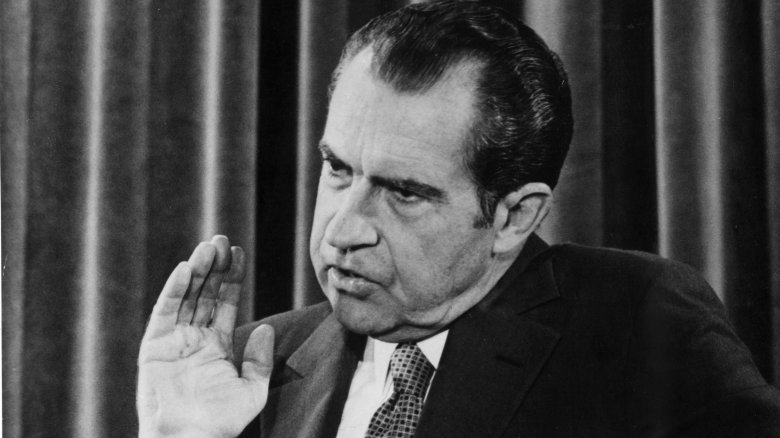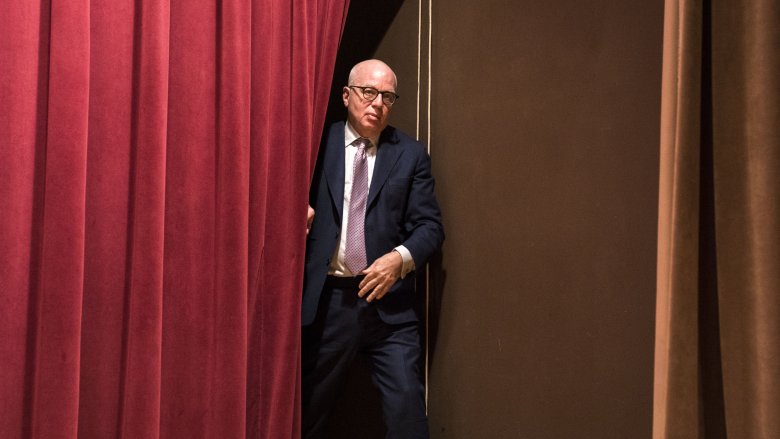People Banned From The White House
We may receive a commission on purchases made from links.
The White House must be kind of an odd place to live or even visit. Working at home is one thing, but spending four to eight solid years working, sleeping, socializing, and eating in the same set of rooms that previous presidents have also lived, slept, and eaten in? Not every president or first family has been so fond of the experience. According to The Atlantic, Ronald Reagan called the White House a "gilded cage," and Jackie Kennedy said that while living there she felt "like a moth hanging on the windowpane."
Weirdness aside, getting to live, work in, or visit the White House has traditionally been seen as a great honor. Because the White House is such an important piece of U.S. culture, there have been several individuals, groups, or entire populations for whom White House visits were specifically taken off the table, even though these people were perfectly free to visit the rest of Washington D.C., drive past, or peek through the gates.
Mooch, we hardly knew ye
If there were an award for the White House employees who entered the job with the highest profile and served the shortest time, then this dubious honor would fall upon Anthony Scaramucci, a man often referred to as "the Mooch." From the moment this outspoken entrepreneur took the job as White House communications director in July 2017, he set headlines ablaze with a number of insulting, profanity-laden interviews, according to USA Today, including one particularly explicit remark about his coworker, Steve Bannon. Just ten days later — barely an "orientation" period in most new jobs — Scaramucci was basically kicked to the curb and told not to let the door hit him on the way out. Ouch.
In March 2018, Bloomberg spilled the beans on the full story, which was even worse: Not only had Scaramucci been removed, he was also placed on an administrative "exclusion list," forbidding him from stepping foot on White House property without special approval. Bloomberg also explained this special approval could only come from Chief of Staff John Kelly or Deputy Chief of Staff Joe Hagin. For his part, Scaramucci largely blamed Kelly for the whole chaotic situation, continuing his streak of insults by referring to Kelly as "General Jackass." Scaramucci initially claimed that he wasn't actually barred from the White House, before the White House itself confirmed that, yes, he was.
British tourists ... in the 21st century?
If someone told you British tourists were banned from the White House, you'd be forgiven for assuming they were talking about some arcane policy that existed during the War of 1812. After all, for the past few centuries, England and the United States are like brothers who kick back beers together, laughing over petty old squabbles. But as of 2017, the truth is a lot weirder. As the official U.K. government policy explains, the friendly citizens of England are not permitted to tour the White House at the time of writing. The Capitol building? Sure, go for it. The Pentagon? Of course! But nope, not the White House.
What's the deal? As the Independent elaborates, the Trump administration reopened official White House tours shortly after moving in and even issued a statement telling all foreign citizens if they wanted to be on of those prized 45-minute tours, all they had to do was submit a tour request to their national embassy in D.C. The problem? Soon afterward, the British Embassy announced that, despite what the White House statement implies, the Department of State had privately informed them to put all applications on hold, and thus deny any tour requests. Is this an accidental communication breakdown or an intentional malfunction? Hard to say for now, but while the block on British tourists made headlines, Snopes did some snooping and discovered that both the the Irish and Mexican embassies were having the same problem.
Teddy Roosevelt's daughter was too wild and independent
Historically, it's been pretty rare that people are publicly banned from the White House. However, one of the more notable exceptions was when Alice Roosevelt, whom the AV Club praised as the country's "most interesting first daughter," raised a few too many eyebrows back in those stuffier days. Decades before second wave feminism kicked off, the daughter of Teddy Roosevelt gained a fiery reputation in political circles by speaking up for herself, breaking rules, not conforming to gender expectations, partying, and above all else, doing whatever she wanted. For example, Alice once stirred up controversy by jumping into a pool with her clothes on and inviting a congressman to join her. She shrugged off any accusations of this action being "scandalous," later saying it only would have been scandalous if she'd taken her clothes off.
The politicians who succeeded Teddy Roosevelt weren't fond of his daughter. History explains that President William H. Taft banned Alice from the White House after discovering she had allegedly buried a "voodoo doll" of Mrs. Taft in the White House's lawn. After Woodrow Wilson became president, Alice got banned again, this time for publicly making a "lewd comment" at Wilson's expense. These attempts to rein in the former first daughter weren't very successful, as Alice went on to comfortably visit future White House administrations, including President Nixon.
The perils of reporting
Trude Feldman is a freelance reporter who has done stories for publications like the Washington Post and the New York Times, but she usually writes for a number of major Jewish outlets. Feldman is well known in D.C. circles, both for having interviewed every president from the mid-20th century onward and for possessing the necessary ambition and stubbornness to always get any tiny bit of information she needs, no matter what obstacles there are. As explained in a 1998 Washington Post article, "She bugs people incessantly until someone breaks down and says yes." And hey, when it comes to reporting, that's a good thing. Martha Brant of Newsweek writes of Feldman that "her methods may be questionable but her persistence is admirable," and points out that Feldman has even shown an ability to get private White House phone numbers.
On at least one occasion, this knack for information-gathering got her in trouble. During the George W. Bush years, Feldman was detected exploring the White House during off-hours and hunting through a press aide's desk. Though a permanent suspension was discussed, the authorities eventually agreed to only ban Feldman for 90 days, after which she was permitted to return.
The reporter who socked a press secretary
Robert Sherrill was a reporter for The Nation, and when he died, fellow journalist Victor Navasky praised Sherrill as a writer who "never kissed ass." A self-proclaimed Western anarchist who loathed corporations, capitalism, crooked politicians, and elitism, Sherrill made a name for himself by writing exposes on corrupt business figures. He was also known for the acerbic, direct, no B.S. reporting style that once got him banned from the White House, when he actually punched out the governor of Florida's press secretary. True to form, he didn't seem to regret it.
Despite the fact that he was denied Secret Service clearance during the time of the LBJ administration, allegedly for "posing a physical threat to the president," according to Foreign Policy, Sherrill continued covering D.C. shenanigans during the next few presidential administrations. Later, Sherill's White House ban was successfully challenged by the American Civil Liberties Union, though Sherill himself didn't bother getting an official pass again. Throughout it all, The Nation continued hiring him as its official White House correspondent.
The Polish president won't be visiting any time soon
As documented by Reuters, the Polish senate drew severe criticism from pretty much every corner of the planet when, in 2018, it approved the so-called "Holocaust law," a proposal that would imprison individuals for three years for using the term "Polish death camps" to refer to the Nazi concentration camps once stationed in Poland, including Auschwitz. Critics believe this law is an example of authoritarian overreach, that it limits free discourse, and that it immorally attempts historical revisionism to downplay the horrific impact of the Holocaust. The United States was among the nations angered by this Holocaust law, and Jewish magazine The Forward reported on a leaked D.C. memo that made it clear that neither the Polish president nor any Polish higher officials would be welcome at the White House until the law is revoked.
Politico explained this policy is just one way communications between the U.S. and Poland are now breaking down, largely due to the Holocaust law. For example, the leaked memo also states there will be be "no high-level bilateral contacts between countries until the crisis gets solved," as well as forbidding Poland from using the law against any U.S. citizen, under the threat of "dramatic" consequences.
If Ryan Lochte can't behave himself in a gas station...
Ryan Lochte might be an Olympic athlete in the pool, but a controversial incident kept him and three teammates — Jack Conger, Jimmy Feigen, and Gunnar Bentz — from swimming their way to the White House. According to Deadline, the swimming crew got in trouble during the last days of the Rio Olympics, when they drunkenly vandalized a gas station bathroom, then allegedly lied to the police about having been victims of an armed robbery. When the discrepancies in this embellished story started pouring out, the swimmers were suspended from the U.S. national team and lost four endorsement deals.
As explained by The Hill, this slew of punishments also included getting barred from the White House. Traditionally, Team USA ceremonially visits the U.S. president's famous home after returning from the Olympics, but Lochte and Co. had their invitations revoked. Lochte eventually accepted blame and admitted he had exaggerated the incident.
Yes, Nixon (mostly) banned the entire Washington Post staff
If you watched 2017's Academy Award-nominated film The Post, you'll remember the scene at the end in which President Nixon becomes so infuriated about the Washington Post's reporting on the Pentagon Papers that he angrily proclaims, "I want it clearly understood from now on, ever, no reporter from the Washington Post is ever to be in the White House. Is that clear?"
Now, Nixon did say this — we even still have the tapes. However, The Post took a little creative license with the timeline. As The Wrap explains, Nixon's comment wasn't actually a response to the Pentagon Papers case: He was angry, six months later, about the paper's coverage of the Watergate scandal. It's also worth noting that while Nixon may have wanted to fully, totally ban the Washington Post, he only managed a partial ban. WaPo reporters were forbidden from nearly the entire White House, with the one exception being the press briefing room, where the Smithsonian says they were permitted to attend carefully scheduled meetings. However, covering social functions was taken completely off the table, as described by the Washington Post itself. That meant this policy particularly hurt the Post's society reporter, Dorothy McCardle, since it cut her off from the White House altogether. With all these technicalities in mind, we'll put an asterisk next to this one, but there's no doubt that Nixon's war against the press still haunts his legacy to this day.
Michael Wolff burned his bridges
These days, anyone who keeps up with political news is quite familiar with Michael Wolff, the American journalist whose controversial book Fire and Fury: Inside the Trump White House hit the bestseller charts like a rocket. While Wolff's reporting techniques have drawn ethical criticism from both sides of the aisle, what's inarguable is that the writer managed to gain a truly bewildering level of access to private conversations, meetings, and figures within the Donald Trump White House. According to the Washington Post, Wolff achieved this by telling all his interviewees he was writing a book titled "The Great Transition: The First 100 Days of the Trump Administration," before pulling back the curtain once his observations were complete.
Well, as everyone knows today, Wolff's intentions were far more damaging than Trump, Bannon, and others realized. The first person to realize this seems to have been John Kelly, who upon replacing Reince Priebus as chief of staff in July 2017, made sure "Wolff was no longer allowed to linger in the West Wing lobby." Given that Trump later attempted to sue the book's publisher, according to Quartz, one can reasonably assert that Michael Wolff is less welcome in the White House than even Anthony Scaramucci.
Stephen Curry's invitation was revoked
What if you and your team are given the rare invitation to visit the White House, but your moral and political disagreements with the current commander-in-chief are so severe that you'd rather avoid the whole thing? That's the inner debate Golden State Warriors MVP Stephen Curry found himself dealing with in 2017, according to the Chicago Tribune. Though Curry himself pretty quickly affirmed that he probably wasn't interested in accepting the president's traditional offer to visit the White House, his team wanted to discuss the matter a little before making a firm decision. Before they could come to a conclusion, President Trump tweeted, "Going to the White House is considered a great honor for a championship team. Stephen Curry is hesitating, therefore invitation is withdrawn!" The Golden State Warriors team said they didn't feel particularly welcome at the White House anyway. Maybe they aren't technically banned; they could probably visit as tourists if they wanted to, but it doesn't seem like they're interested.
